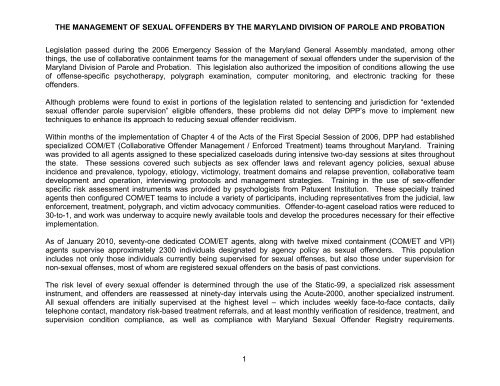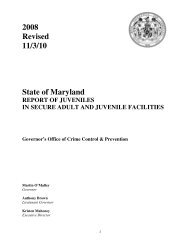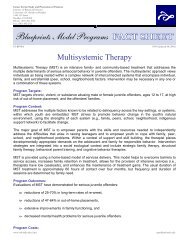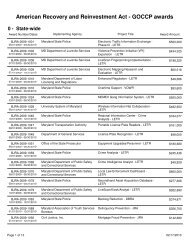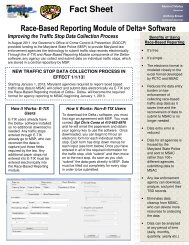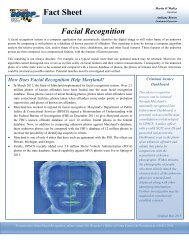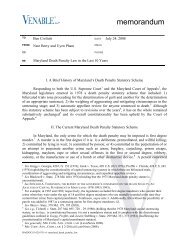Sex Offender Management by the Maryland Division of Parole ...
Sex Offender Management by the Maryland Division of Parole ...
Sex Offender Management by the Maryland Division of Parole ...
You also want an ePaper? Increase the reach of your titles
YUMPU automatically turns print PDFs into web optimized ePapers that Google loves.
THE MANAGEMENT OF SEXUAL OFFENDERS BY THE MARYLAND DIVISION OF PAROLE AND PROBATION<br />
Legislation passed during <strong>the</strong> 2006 Emergency Session <strong>of</strong> <strong>the</strong> <strong>Maryland</strong> General Assembly mandated, among o<strong>the</strong>r<br />
things, <strong>the</strong> use <strong>of</strong> collaborative containment teams for <strong>the</strong> management <strong>of</strong> sexual <strong>of</strong>fenders under <strong>the</strong> supervision <strong>of</strong> <strong>the</strong><br />
<strong>Maryland</strong> <strong>Division</strong> <strong>of</strong> <strong>Parole</strong> and Probation. This legislation also authorized <strong>the</strong> imposition <strong>of</strong> conditions allowing <strong>the</strong> use<br />
<strong>of</strong> <strong>of</strong>fense-specific psycho<strong>the</strong>rapy, polygraph examination, computer monitoring, and electronic tracking for <strong>the</strong>se<br />
<strong>of</strong>fenders.<br />
Although problems were found to exist in portions <strong>of</strong> <strong>the</strong> legislation related to sentencing and jurisdiction for “extended<br />
sexual <strong>of</strong>fender parole supervision” eligible <strong>of</strong>fenders, <strong>the</strong>se problems did not delay DPP’s move to implement new<br />
techniques to enhance its approach to reducing sexual <strong>of</strong>fender recidivism.<br />
Within months <strong>of</strong> <strong>the</strong> implementation <strong>of</strong> Chapter 4 <strong>of</strong> <strong>the</strong> Acts <strong>of</strong> <strong>the</strong> First Special Session <strong>of</strong> 2006, DPP had established<br />
specialized COM/ET (Collaborative <strong>Offender</strong> <strong>Management</strong> / Enforced Treatment) teams throughout <strong>Maryland</strong>. Training<br />
was provided to all agents assigned to <strong>the</strong>se specialized caseloads during intensive two-day sessions at sites throughout<br />
<strong>the</strong> state. These sessions covered such subjects as sex <strong>of</strong>fender laws and relevant agency policies, sexual abuse<br />
incidence and prevalence, typology, etiology, victimology, treatment domains and relapse prevention, collaborative team<br />
development and operation, interviewing protocols and management strategies. Training in <strong>the</strong> use <strong>of</strong> sex-<strong>of</strong>fender<br />
specific risk assessment instruments was provided <strong>by</strong> psychologists from Patuxent Institution. These specially trained<br />
agents <strong>the</strong>n configured COM/ET teams to include a variety <strong>of</strong> participants, including representatives from <strong>the</strong> judicial, law<br />
enforcement, treatment, polygraph, and victim advocacy communities. <strong>Offender</strong>-to-agent caseload ratios were reduced to<br />
30-to-1, and work was underway to acquire newly available tools and develop <strong>the</strong> procedures necessary for <strong>the</strong>ir effective<br />
implementation.<br />
As <strong>of</strong> January 2010, seventy-one dedicated COM/ET agents, along with twelve mixed containment (COM/ET and VPI)<br />
agents supervise approximately 2300 individuals designated <strong>by</strong> agency policy as sexual <strong>of</strong>fenders. This population<br />
includes not only those individuals currently being supervised for sexual <strong>of</strong>fenses, but also those under supervision for<br />
non-sexual <strong>of</strong>fenses, most <strong>of</strong> whom are registered sexual <strong>of</strong>fenders on <strong>the</strong> basis <strong>of</strong> past convictions.<br />
The risk level <strong>of</strong> every sexual <strong>of</strong>fender is determined through <strong>the</strong> use <strong>of</strong> <strong>the</strong> Static-99, a specialized risk assessment<br />
instrument, and <strong>of</strong>fenders are reassessed at ninety-day intervals using <strong>the</strong> Acute-2000, ano<strong>the</strong>r specialized instrument.<br />
All sexual <strong>of</strong>fenders are initially supervised at <strong>the</strong> highest level – which includes weekly face-to-face contacts, daily<br />
telephone contact, mandatory risk-based treatment referrals, and at least monthly verification <strong>of</strong> residence, treatment, and<br />
supervision condition compliance, as well as compliance with <strong>Maryland</strong> <strong>Sex</strong>ual <strong>Offender</strong> Registry requirements.<br />
1
THE MANAGEMENT OF SEXUAL OFFENDERS BY THE MARYLAND DIVISION OF PAROLE AND PROBATION<br />
<strong>Offender</strong>s are moved to lower supervision levels only on <strong>the</strong> basis <strong>of</strong> consistent successful compliance with all<br />
requirements and satisfactory risk assessment scores.<br />
The management <strong>of</strong> sexual <strong>of</strong>fenders now includes <strong>the</strong> use <strong>of</strong> technology to augment o<strong>the</strong>r proven supervision strategies.<br />
Included in this approach are:<br />
• Clinical polygraph examination - a highly effective tool for exploring <strong>the</strong> type and severity <strong>of</strong> <strong>of</strong>fender’s abusive<br />
behavior patterns and for investigating compliance with treatment and supervision conditions. Polygraph testing<br />
can also be useful in determining <strong>the</strong> need for changes in levels <strong>of</strong> supervision and treatment, and can improve<br />
treatment outcomes <strong>by</strong> shortening <strong>the</strong> denial phase. Polygraph testing can increase <strong>the</strong> accountability <strong>of</strong> sexual<br />
<strong>of</strong>fenders for past behaviors as well as those which may occur while under supervision; ensuring compliance with<br />
supervision and treatment requirements and serving as an additional deterrent to re-<strong>of</strong>fending. Polygraph testing<br />
also assists ongoing monitoring efforts through <strong>the</strong> early identification <strong>of</strong> supervision rule violations and criminal<br />
behavior. All sexual <strong>of</strong>fenders released on parole or mandatory release supervision are required to undergo an<br />
initial polygraph test within thirty days <strong>of</strong> release and at least two subsequent examinations at six month intervals.<br />
• Computer monitoring - involving <strong>the</strong> installation on an <strong>of</strong>fender’s computer <strong>of</strong> s<strong>of</strong>tware designed to provide an<br />
agent with access to <strong>the</strong> contents <strong>of</strong> <strong>the</strong> computer as well as <strong>the</strong> ability to monitor and record all <strong>of</strong> <strong>the</strong> activity<br />
conducted on that computer. It can be programmed to restrict access to particular activities (such as chat rooms<br />
and file sharing programs) or designated web sites (including social networking sites), or to block Internet access<br />
altoge<strong>the</strong>r. It is used to help inform COM/ET agents about <strong>the</strong> deviant interest and arousal patterns <strong>of</strong> <strong>of</strong>fenders,<br />
and for controlling access to potential victims through Internet communication. As a result, such monitoring can be<br />
useful in preventing victimization, in more accurately assessing risk level, and for determining <strong>the</strong> need for changes<br />
in levels <strong>of</strong> supervision, treatment and Internet access, or <strong>the</strong> initiation <strong>of</strong> violation proceedings. Agency policy<br />
requires computer monitoring for any sexual <strong>of</strong>fender released from <strong>the</strong> <strong>Division</strong> <strong>of</strong> Correction who is required to<br />
register with <strong>the</strong> <strong>Maryland</strong> <strong>Sex</strong>ual <strong>Offender</strong> Registry as a Child <strong>Sex</strong>ual <strong>Offender</strong>. In addition, computer monitoring<br />
is used for any sexual <strong>of</strong>fender whose criminal history includes an <strong>of</strong>fense involving child pornography, or behavior<br />
in which access to <strong>the</strong> victim was accomplished through <strong>the</strong> use <strong>of</strong> <strong>the</strong> internet. <strong>Sex</strong>ual <strong>of</strong>fenders with special<br />
conditions mandating computer monitoring who deny having access to a computer are referred for periodic<br />
polygraph examination to confirm <strong>the</strong>ir compliance with <strong>the</strong> imposed restrictions.<br />
• Electronic tracking - specifically Global Positioning System (GPS) tracking, as a means <strong>of</strong> monitoring an<br />
<strong>of</strong>fender’s whereabouts on a continuous (twenty-four hours per day, seven days per week) basis. The passive<br />
2
THE MANAGEMENT OF SEXUAL OFFENDERS BY THE MARYLAND DIVISION OF PAROLE AND PROBATION<br />
system used <strong>by</strong> <strong>the</strong> <strong>Division</strong> <strong>of</strong> <strong>Parole</strong> and Probation records an <strong>of</strong>fender’s location throughout <strong>the</strong> day and,<br />
through a daily download <strong>of</strong> accumulated data, provides details regarding <strong>the</strong> <strong>of</strong>fender’s location and movement at<br />
regular time intervals (a minimum <strong>of</strong> every ten minutes). The system provides agents with <strong>the</strong> ability to establish,<br />
modify, and monitor curfews for <strong>of</strong>fenders. It also enables <strong>the</strong>m to set geographic exclusion and inclusion zones<br />
unique to each specific <strong>of</strong>fender and his or her criminal behavior patterns, and generates alerts when a sexual<br />
<strong>of</strong>fender violates <strong>the</strong> rules established <strong>by</strong> <strong>the</strong> agent. Current agency policy requires a minimum <strong>of</strong> ninety days <strong>of</strong><br />
GPS tracking for any sexual <strong>of</strong>fender upon release from <strong>the</strong> <strong>Division</strong> <strong>of</strong> Correction. Tracking can be extended for<br />
as long as deemed appropriate.<br />
SEX OFFENDER INTAKES, CLOSINGS, AND SEX OFFENSE ARRESTS: JULY 2008 THROUGH DECEMBER 2009<br />
2008-2009 JUL AUG SEP OCT NOV DEC JAN FEB MAR APR MAY JUN JUL AUG SEP OCT NOV DEC<br />
CASES OPENED 125 116 136 117 107 120 118 113 119 116 128 98 138 112 143 102 99 95<br />
CASES CLOSED 121 112 106 126 123 136 114 132 125 132 119 125 123 112 122 110 109 74<br />
SATISFACTORY<br />
CLOSING<br />
83% 79% 75% 82% 72% 72% 83% 77% 81% 70% 77% 79% 76% 80% 78% 74% 78% 80%<br />
TECHNICAL<br />
REVOCATION<br />
10% 14% 8% 10% 15% 17% 7% 9% 10% 17% 15% 8% 15% 14% 16% 15% 9% 14%<br />
NEW OFFENSE<br />
REVOCATION<br />
7% 7% 17% 8% 13% 11% 10% 14% 9% 13% 8% 13% 9% 6% 6% 11% 13% 6%<br />
NEW ARRESTS<br />
FOR SEX<br />
OFFENSES<br />
4 5 4 2 7 2 3 3 3 2 5 5 3 3 2 0 4 2<br />
During <strong>the</strong> eighteen months from July 2008 through December 2009, between 83% and 94% <strong>of</strong> sex <strong>of</strong>fender cases closed<br />
each month were closed ei<strong>the</strong>r in satisfactory status or <strong>by</strong> revocation in response to a technical violation. Whe<strong>the</strong>r <strong>the</strong>se<br />
individuals chose not to engage in fur<strong>the</strong>r unlawful behavior, or a DPP agent intervened to possibly prevent such<br />
behavior, none <strong>of</strong> <strong>the</strong>se cases were terminated on <strong>the</strong> basis <strong>of</strong> a subsequent <strong>of</strong>fense committed while under supervision.<br />
3
THE MANAGEMENT OF SEXUAL OFFENDERS BY THE MARYLAND DIVISION OF PAROLE AND PROBATION<br />
Of those who did incur subsequent arrests during this period, less than one-third <strong>of</strong> one percent <strong>of</strong> <strong>the</strong> sex <strong>of</strong>fenders<br />
under active supervision were charged with subsequent sexual <strong>of</strong>fenses.<br />
In addition, <strong>the</strong> number <strong>of</strong> arrests for sexual <strong>of</strong>fenses declined from 24 during <strong>the</strong> initial six-month period, to 21 during <strong>the</strong><br />
second six-month period, to 14 (7 <strong>of</strong> which were misdemeanor <strong>of</strong>fenses) during <strong>the</strong> six-month period ending December<br />
2009.<br />
4


